Randolph presents Pearl S. Buck Award to Jetsun Pema, the ‘Mother of Tibet’
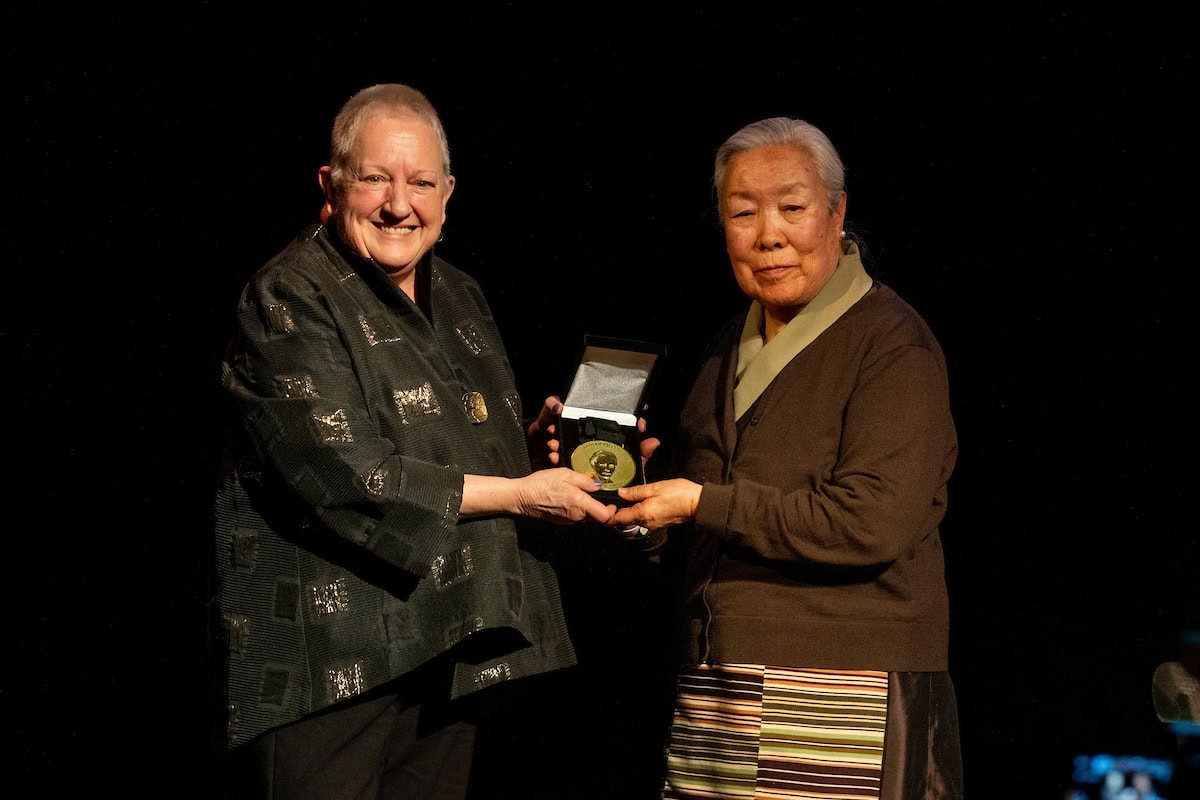
President Sue Ott Rowlands presents Jetsun Pema with the Pearl S. Buck Award on Thursday, Sept. 18, 2024.
Jetsun Pema, who has dedicated her life to educating Tibetan children in exile, was officially recognized as the seventh recipient of Randolph College’s prestigious Pearl S. Buck Award during a ceremony in Smith Hall Theatre Thursday evening.
The award is given to women who exemplify the ideals, values, and commitments of Buck, a member of the Class of 1914 and the first American woman to receive the Nobel Prize for Literature.
The younger sister of His Holiness the 14th Dalai Lama, Pema served as president of the Tibetan Children’s Villages (TCV), an organization that takes in and cares for orphaned, destitute, and refugee children. She served the TCV from 1964 to 2006 and has been recognized as the “Mother of Tibet” by the Tibetan Parliament-in-Exile.
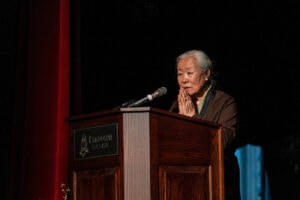
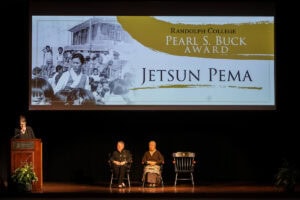
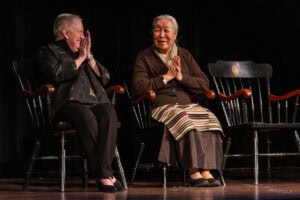
“It is a great privilege and honor to receive the Pearl S. Buck Award, and I gladly accept it on behalf of all TCV staff who have worked with me and are still taking care of the children,” Pema said while accepting the award. “Today, over 53,000 Tibetan children have gone through their education. They’re scattered all over the world, and they’re able to give back.”
Several hundred people attended the event, including Pema’s family and friends, former TCV students, and members of Tibetan communities in the states.
The ceremony began with a screening of the documentary “Amala: The Life and Struggles of the Dalai Lama’s Sister.”
During an introduction of Pema, professor Suzanne Bessenger shared quotes from former TCV students.
One called her the “epitome of love in action for Tibetan children in exile,” while another said Pema’s aura and kindness are unmatched.
“It is not an exaggeration to say the schools and the refuge they provided to children would not exist without Jetsun Pema,” said Bessenger, Randolph’s Barbara Boyle Lemon ’57 and William J. Lemon Associate Professor of Religious Studies and an associate professor of comparative philosophy. “She truly epitomizes the tradition of service and compassion the Pearl S. Buck Award recognizes.”
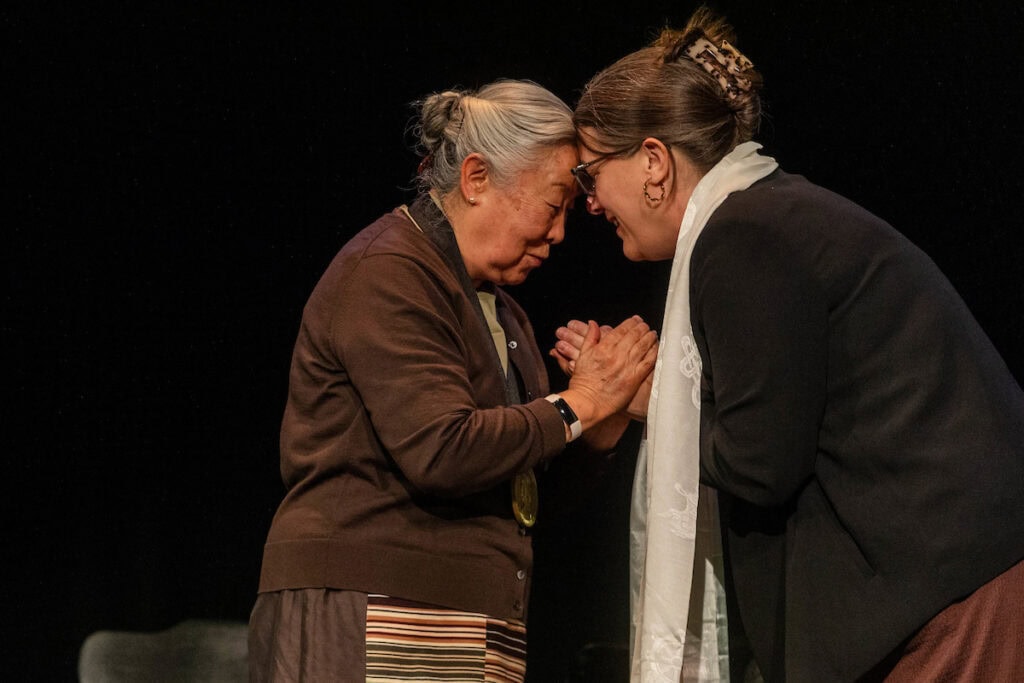
Jetsun Pema presented Randolph professor Suzanne Bessenger with a ceremonial scarf offered as a sign of respect, gratitude, or greeting.
Pema was born in 1940 in Lhasa, the capital of Tibet, where her older brother had already been recognized as the 14th Dalai Lama.
She began her formal education at the age of 9 at St. Joseph’s Convent in Kalimpong. She was a young girl attending school in India in 1959 when the Dalai Lama was forced into exile to take refuge there after China’s invasion of Tibet.
Pema continued her studies in Switzerland and England and, in 1964, she returned to India after the sudden death of her eldest sister to take responsibility of running the TCV in Dharamsala.
Called “Amala,” or Respected Mother, by the children, Pema has led TCV to become one of the most successful Tibetan institutions in exile. Today, projects include five children’s villages with attached schools, seven residential schools, seven day schools, 10 day care centers, four vocational training centers, four youth hostels, four homes for the elderly, and an outreach program for over 2,000 children in exile.
She is also the first woman elected to the post of minister in the Tibetan Parliament-in-Exile, serving as minister for education.
She is the recipient of numerous international awards, including the World’s Children’s Prize for the Rights of the Child (Sweden), the Woman of Courage Award, the Maria Montessori Award in Italy, and a UNESCO Medal, as well as the prestigious Nari Shakti Puraskar award given by the Indian government to individual women or institutions that work toward the cause of women’s empowerment.
During Thursday’s ceremony, Pema presented Randolph President Sue Ott Rowlands and Bessenger with traditional Tibetan scarves that signify respect, gratitude, or greeting.
She also recalled TCV’s humble beginnings and the mandate from her brother to provide Tibetan children with a strong education
“The education we have given to our young people has benefitted them greatly and has empowered them,” she said. “Everywhere you go, you find ex-TCV students, and that is encouraging.”
Pema is the seventh recipient of Randolph’s Pearl S. Buck Award, which includes a medallion and $25,000 prize. Pema told the audience she would donate the award money back to TCV, where it would make a significant difference in the education of the children there.
Previous winners, who also visited the College’s campus to accept the award, include Maya Lin (2004), an artist and designer responsible for the Vietnam Veterans Memorial; Mary Robinson (2003), the former president of Ireland; Jehan Sadat (2001), the former first lady of Egypt; Sheikh Hasina (2000), the former prime minister of Bangladesh; Corazon Aquino (1998), the former president of the Philippines; and Maxine Hong Kingston (2016), an acclaimed author known for works that blend her family’s stories in the United States with Chinese folklore.
Buck is known for her humanitarian work and for being a champion of civil rights, women’s rights, children’s rights, and the rights of those with disabilities long before these issues were talked about in public.
Her book, The Good Earth, for which she was awarded the Pulitzer Prize, offered a description of life in a Chinese peasant village and included perspectives of women who lived and experienced everyday hardships. Her tireless efforts to increase understanding between Asia and America left a lasting imprint on the world.
Tags: Pearl S. Buck Award

